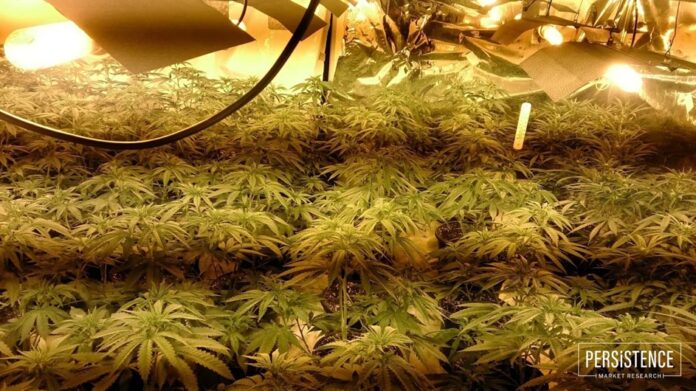The latest Persistence Market Research report titled Industrial Hemp Market: Global Industry Analysis 2013-2017 and Forecast 2018-2027 offers key insights on the global industrial hemp market in terms of value and volume. The global industrial hemp market is expected to grow at a healthy CAGR of 18.3% in terms of value over the forecast period.
On the basis of product type, the seeds segment is expected to hold a substantial revenue share of 66.7% for year 2017 in the global industrial hemp market with a CAGR of 17.7%. On the basis of application, the hemp CBD segment is expected to grow at a robust CAGR of 18.6% by volume with growing demand from the health and wellness sector.
The global industrial hemp market has been witnessing healthy growth, owing to the use of the product in more than 25,000 products across about nine sectors, including food and beverage, textile, paper, construction, personal care, furniture and automobile. Industrial hemp is an annual plant and almost every part of the plant, such as seed, stalk and flower, is useful in a large number of applications.
Industrial hemp is used in the processing and manufacturing of a number of products, which include insulation and construction material, paper, textile, fiberglass, nutraceutical, personal care products, bio-plastics and bio-fuel. It is largely grown for food & beverage as well as non-food based products without the use of toxic chemicals, herbicides, pesticides and fertilizers.
Industrial hemp, being a fast growing plant, offers as a renewable and environmentally efficient raw material for the production of various products such as plastic, paper and fuel.
Production of industrial hemp is legal in more 30 countries around the globe. China, France and Canada are the key producers of industrial hemp whereas the U.S. is a key importer. Industrial hemp is often confused with marijuana plant and hence, is legally banned for cultivation in many countries, including most of the U.S. However, with rising awareness and increasing demand for industrial hemp from applications across various sectors, many countries are legalizing industrial hemp.
As we stand at the threshold of a new era in agriculture and industry, the industrial hemp market emerges as a beacon of promise and potential. With its versatile applications, sustainable cultivation practices, and expanding legal landscape, industrial hemp is poised to revolutionize various sectors, from textiles and construction to healthcare and environmental remediation. In this blog post, we’ll explore the factors driving the promising trajectory of the industrial hemp market and the transformative impact it’s set to make in the future.
- Legislative Developments and Regulatory Support: One of the primary drivers behind the growth of the industrial hemp market is the evolving legislative landscape and increasing regulatory support. In recent years, many countries have recognized the economic and environmental benefits of hemp cultivation, leading to the legalization of industrial hemp farming for commercial purposes. This shift in policy has unlocked new opportunities for farmers, entrepreneurs, and investors, paving the way for the widespread adoption of hemp-derived products across industries.
- Diverse Applications Across Industries: Industrial hemp is a remarkably versatile crop with applications spanning a wide range of industries. In textiles, hemp fibers are prized for their strength, durability, and sustainability, making them an ideal alternative to conventional materials like cotton and polyester. In construction, hempcrete—a mixture of hemp fibers, lime, and water—offers a sustainable and energy-efficient building material with excellent thermal insulation properties. Additionally, hemp-derived products such as CBD oil and hemp-based plastics are gaining popularity in the healthcare and packaging sectors, respectively, further diversifying the market’s offerings.
- Environmental Sustainability and Carbon Sequestration: Sustainability is a driving force in today’s market landscape, and industrial hemp is emerging as a key player in the quest for eco-friendly solutions. Hemp cultivation requires minimal water and pesticides compared to traditional crops, making it a more sustainable option for farmers. Moreover, hemp plants have a remarkable ability to sequester carbon dioxide from the atmosphere, helping to mitigate climate change and reduce greenhouse gas emissions. As environmental concerns continue to mount, the sustainability credentials of industrial hemp are expected to drive demand and market growth.
- Research and Innovation Fueling Product Development: Research and innovation are driving advancements in hemp cultivation techniques, product development, and manufacturing processes. Scientists and entrepreneurs are exploring new varieties of hemp with enhanced properties, such as higher fiber content or increased cannabinoid concentrations. Additionally, technological innovations are improving extraction methods and refining processes, leading to higher-quality hemp-derived products with improved efficacy and consistency. These advancements in research and innovation are fueling the expansion of the industrial hemp market and unlocking new opportunities for growth and innovation.
- Consumer Awareness and Demand for Natural Products: As consumers become more conscious of their health and environmental impact, there is a growing demand for natural, sustainable products derived from renewable sources like industrial hemp. From organic textiles and eco-friendly building materials to plant-based supplements and biodegradable plastics, hemp-derived products resonate with environmentally conscious consumers seeking ethical and sustainable alternatives. This increasing consumer awareness and demand are driving market growth and encouraging businesses to invest in hemp-based solutions.
Conclusion: As we look to the future, the industrial hemp market holds immense promise for economic growth, environmental sustainability, and technological innovation. With supportive legislation, diverse applications across industries, environmental benefits, ongoing research and innovation, and increasing consumer demand, industrial hemp is poised to play a transformative role in shaping the future of agriculture, industry, and sustainability. By embracing the potential of industrial hemp and capitalizing on emerging opportunities, stakeholders can contribute to a more sustainable and prosperous future for generations to come.








